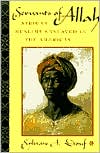

 |

|

The average rating for Servants of Allah: African Muslims Enslaved in the Americas based on 2 reviews is 4.5 stars.
Review # 1 was written on 2017-03-16 00:00:00 Louise Mueller Louise MuellerAsalaamu alaykum. This book is a must-read for anyone from the Americas (US, Caribbean, South America...), whether Muslim or not! This is an important piece of our collective history that is widely overlooked and unknown to most of us. I recently read this book for a Muslim book club that I lead. Below are my notes -- I highly recommend it for a book group, as it covers many issues that are incredibly relevant today (page numbers correspond to the edition published in 1998): Servants of Allah by Sylviane Diouf: Guideline for Discussion -Highlights difference between slavery/treatment of slaves in Africa and the Americas -Slavery in Islam -Challenges idea of enslaved Africans as helpless/nameless/uneducated: --"Ulama, qadi, marabouts - all these men who had devoted years of studying spent most of their lives performing the most menial and tedious work, which was the lot of slaves on the American plantation" (Pg. 35) -Challenges idea that enslaved people lack agency: --"They were agents of their own destiny" (Pgs. 40-41) --"They made decisions, planned, gathered...all unbeknownst to white society; and they met with success" (Pg. 118) --This approach should be applied to understanding of other groups such as forced migrants/refugees today -Racial hierarchy/pseudo-ethnography: --Many educated Muslims were referred to as "Arabs" or "Moors" because whites could not accept the idea that African slaves were literate...sometimes more so than their owners (pg. 109) -Dominant views then and now: --Islamophobia: in early days of (Spanish) slave trade, African Muslims were brought to Europe to be Christianized before going to Americas due to fear of spread of Islam to new colonies → Trump/Muslim ban/etc. --Literacy: novelty of literate/educated people of African descent; whites were fascinated by Africans' abilities to write in Arabic → today white America still comments on African Americans who are "articulate" or "well-spoken" --Ignorance about Africa: Lamine Kebe - "There are good men in America, but all are very ignorant of Africa…" (Pg. 144). No comment! -Other thoughts: --How different would race relations be in the US if a more complete history of Africa were taught in schools? What if enslaved Africans were presented as thinking/acting people with names, families, religions, as opposed to silent masses only to be pitied? --How different would the understanding of Islam's place in the US be, if its origins in this country were more widely known? --Best quote of the book!! : "There were thus multilingual men in the Americas and the Caribbean who spoke African and European languages, mastered a dead language, and could read and write in two very diverse alphabets. Only a handful of these were European American intellectuals; most were Africans working as cotton pickers and cane cutters." (Pg. 122) |
Review # 2 was written on 2010-03-02 00:00:00 Peter Jones Peter JonesThe most important book one can read to get an in depth understanding of how African Muslims reacted to the advent of the trans-Atlantic slave trade and how their presence affected the plantation societies of the New World. |
CAN'T FIND WHAT YOU'RE LOOKING FOR? CLICK HERE!!!